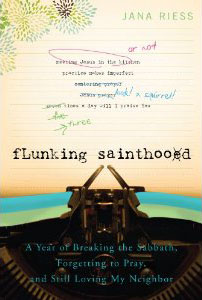What Gratitude Is Not
Posted on Apr 16, 2012 by Trevor in Religion
 The following is an excerpt from Jana Riess‘s new memoir, Flunking Sainthood. In the following portion of her humorous book, this insightful LDS editor and blogger takes a unique approach to exploring the meaning of gratitude by examining what it is not.
The following is an excerpt from Jana Riess‘s new memoir, Flunking Sainthood. In the following portion of her humorous book, this insightful LDS editor and blogger takes a unique approach to exploring the meaning of gratitude by examining what it is not.
Oddly, the root word for “gratitude,” gratia, didn’t start appearing in Christian literature until about eight hundred years ago. That’s not to say that Christians before the High Middle Ages didn’t feel gratitude—they just didn’t wax on about it. In her fascinating cultural study The Gift of Thanks, Margaret Visser writes that although contemporary Americans and some Europeans think that gratitude is ingrained, necessary, and automatic, there are entire cultures where the concept of saying thank you is still largely absent. Some languages have no word for thanks, a fact that’s hard for Americans to wrap our heads around. When European colonizers came to the New World back in the day, they were horrified that Native Americans didn’t thank them for the gifts they brought—because when someone brings you smallpox as a souvenir of their homeland, the least you can do is say thank you.
In contrast, other cultures have umpteen different ways to express gratitude, based on the giver’s relationship to the recipient. In Japan, if someone so much as passes you a salt shaker, you don’t merely thank the giver, but instead launch into a self-abnegating apology for your existence on the planet and your annoying and perpetual need to breathe.
As I’m reading, I think about Visser’s point that much of what we imagine as authentic gratitude is actually cultural expectation of what a polite, civilized person does. Politeness greases the wheels of society. We make nice. However, true gratitude rarely exists in these automatic, expected formalities. True gratitude is something else altogether.
I’m intrigued by the idea that gratitude is a relatively recent development in Western civilization. This strikes me as ironic, given how in my own experience, gratitude often springs from a remembrance of deprivation. When I get the stomach flu, I’m shocked to realize how quickly a healthy person can become a shaking mass on a chilly bathroom floor. But in twenty-first century America, we enjoy fabulous health and longevity compared to any other time in history. So why are our bookstore shelves littered with titles on the importance of gratitude and the quest for happiness, while our pockmarked ancestors just sucked it up in silence?
Maybe we focus on gratitude because we feel guilty—and scared. We know at a deep level that we’re ludicrously wealthy and healthy. We’re also terrified of that ease and comfort disappearing. So we read books and articles about gratitude as a cardinal virtue not because we genuinely feel grateful, but because we’re afraid of how God might smite us if we don’t. There’s a whole movement centered around “the power of gratitude,” promising that when we say thank you for our blessings, we will “unleash unlimited abundance and happiness.” You can find similar advice in books like How to Want What You Have and Thank You Power and Focus on the Good Stuff. The problem is that this so-called gratitude is actually more about manipulating the universe into giving us even greater blessings than it is about being grateful for the ones we already enjoy. It’s like a kid after a birthday party who only sends Grandma a thank-you card because he’s hoping for a more expensive present for Christmas.
I object to the proliferation of self-help books that promise that gratitude will magically make everything all better. Some years ago when the bestseller The Secret was all the rage, I wrote a blog review so sarcastic that I was contacted by a Dutch journalist who wanted to get the snarky American on camera to declare that merely saying thank you to the universe wasn’t going to alter a person’s reality. The reporter was charmed by the fact that I’d gone back through the diary of Dutch girl Anne Frank to refute the basic premise of Rhoda Byrne‘s self-help chartbuster: that only good things will happen to those who think good thoughts,  and only bad things will happen to those who think negative thoughts. This pablum is known as the “Law of Attraction.” In the review, I pointed out how Anne Frank wasn’t exactly spewing negativity with statements such as, “I don’t think of all the misery but of all the beauty that remains,” and, “I keep my ideals, because in spite of everything, I still believe that people are really good at heart.” And yet she was victimized, as were millions of others. Their “attitude of gratitude” had little to do with whether they lived through the Holocaust, though some survivors have said that positive thinking helped them regroup and succeed after the war.
and only bad things will happen to those who think negative thoughts. This pablum is known as the “Law of Attraction.” In the review, I pointed out how Anne Frank wasn’t exactly spewing negativity with statements such as, “I don’t think of all the misery but of all the beauty that remains,” and, “I keep my ideals, because in spite of everything, I still believe that people are really good at heart.” And yet she was victimized, as were millions of others. Their “attitude of gratitude” had little to do with whether they lived through the Holocaust, though some survivors have said that positive thinking helped them regroup and succeed after the war.
Gratitude didn’t save Anne Frank, and it won’t save us. It won’t heal our diseases, make us rich, or bring us fame. We’d love to make gratitude a talisman to magically protect us from disaster, but there is nothing Christian about this; it’s as pagan as the hills to stage-manage the universe into bending to our will. Gratitude is just a gentler way to force the issue, and it’s a lot less messy than, say, sacrificing a bison on the altar. But using gratitude as a carrot to precipitate the universe’s bestowal of a gift is as pagan as the blood sacrifice. If we ever catch ourselves thinking about how God should reward our sunny dispositions with worldly blessings, or imagining that if we’re not grateful for what we already have that God will justifiably withhold further blessings like Santa refusing to bring toys to naughty children at Christmas, then we need to take a long and hard look at what we believe about God. God doesn’t owe us anything, no matter how cheerful and uncomplaining we are. Period.


Chris Taylor
May 14th, 2012
Interesting thoughts, Trevor. It’s really true that we think expressing gratitude will somehow bend the universe to our will. Thanks for this.